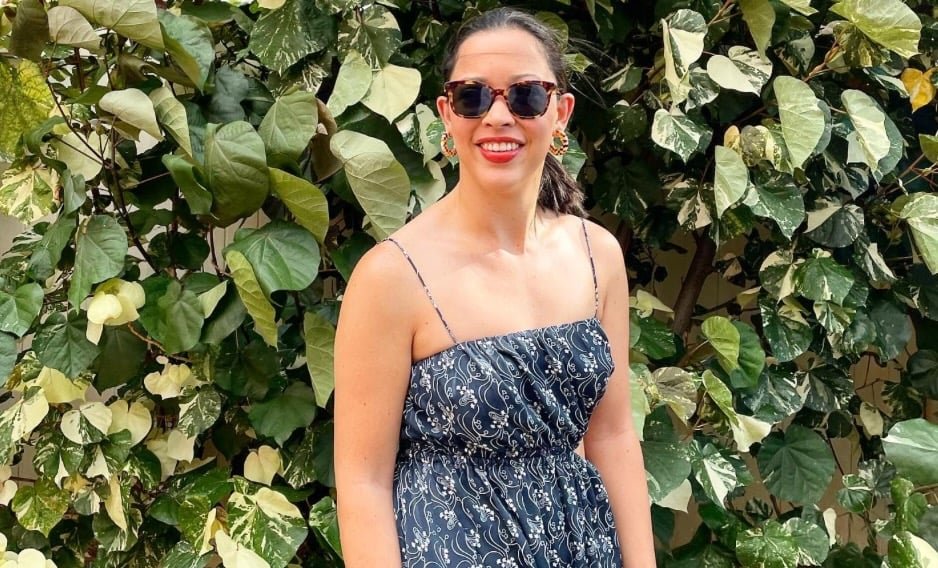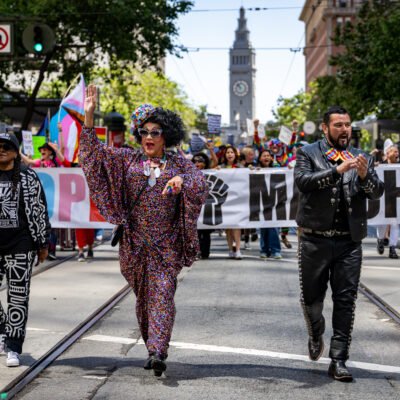

I have a face that is, for better or worse, approachable. In college, a friend mentioned that before we met, she’d see me around campus and think, “There goes that girl who smiles a lot.” Okay, yes, I smile a lot. I sometimes smile when I’m uncomfortable; I’ve been known to laugh when I’m sad. But, inevitably, this unflappable approachability of mine tends to lead to this type of interaction:
Stranger: Hi…um…
Me: Hi!
Stranger: No offense, but can I ask you a question?
I can’t get offended too easily as a mixed-race, disabled woman. If I did, I’d have a hard time leaving my home. But then I do leave my home and strangers feel comfortable talking to me as if we’ve already gone out for ice cream. I usually know what they’re wanting to ask.
It’s a version of, “What’s going on with you?” (Insert hand gestures waving from the waist down.)
Strangers want me to disclose something about my disability, to share why my legs bend inward when I walk. I wish I could ask some random fellow why he chose to go with a mustache rather than a full beard on his facial hair journey, but I try not to let my curiosity get the best of me. I know what it’s like to have cerebral palsy and want to keep that fact to myself. Yet at the same time, I understand this compulsion completely. For generations, disability was seen as something to shroud, a detail to deliberately deplete of complexity. And then a non-disabled person sees someone who looks nice and walks strange and thinks, “Okay, well, if I can’t ask her, then who can I ask?”
I called on a few friends to share the questions that they’ve wondered as we’ve gotten closer, or questions non-disabled people may want to know in general, to provide more context around a disabled life. Here are their questions and my answers.
What would you like to change about depictions of disability in the media? Are there any that stand out to you (either good or bad)?
In the media, disability is often associated with sadness, despair, and death, but daily life is rarely that intense. I would totally go see a Wedding Planner-style rom-com where a disabled woman’s cane gets caught in a manhole cover and Matthew McConaughey comes to yank it out. I would be into an Ocean’s 11-style blockbuster where a wheelchair-using maverick figures out how to get into a highly-guarded building, which wouldn’t be that much of a stretch. But I also wouldn’t mind a dialogue-driven film between friends who are navigating some sense of yearning while getting dinner together in the middle of the week. Disabled people have friends, feelings, and witty one-liners to share, too.
There’s a movie that won the Best Picture Oscar way back in 1946 called The Best Years of Our Lives, and I love it so much. Not only is it a great story about three WWII veterans who return home — and I promise, the humor and heart still land — but the film features an actual disabled veteran, Harold Russell, playing the true-to-life role of losing his hands after enlisting. (Fun fact: He’s the only actor to ever win two Oscars for the same role.) There’s a scene where Russell’s character shows his girlfriend what he needs to do in order to get ready for bed, thinking she’ll run for the hills if she knows how vulnerable he is behind closed doors. Watching their mutual response to his honesty makes me cry every time — it’s just incredibly warm and realistic.
What are the best ways for people in your life to support you, either emotionally or literally?
This depends on each individual person, of course, and the relationship they have with their body. I really appreciate it when friends and family lock my arm in theirs as we walk, for example, because then I don’t have to pay as much attention to what’s in my path and can focus more on our conversation. Emotionally, my loved ones believe me when I say that something is hard for me, when it may not be hard for them. Also, they don’t always try to fix the issue — usually I only want someone else to say, “Yep, that sucks,” and I’ll feel better. It’s too bad that no one in this inner circle is, like, a city planner or a lawmaker, but who knows what the future holds.
If you want to be an ally, take things slowly. Get to know a disabled person for all the things they are: the food they crave and their celebrity crush; the show they can watch on repeat and the outfit they feel confident in. The intricacies of their disability are at the center of their world, but it’s usually locked away because there are too many people who say “ew” and “so what” or “you’re lying” when these differences are made clear. This kind of pushback can be found everywhere, from questions at elementary-school recess and college dorm room small talk, to doctor’s office checkups and job interviews, to brunch chatter and social media comments. Ableism can be so pervasive and accepted in our culture that too often the pang of exclusion only registers to a disabled person and the allies who know better.
In budding friendships and romantic relationships, I do have to say early on what I need to be comfortable physically, so sometimes support comes as a crash course. But sustained support is the gift both parties get from sticking around, which is true of any relationship. Let the disabled person lead your education, and if you need clarity, ask with care. “How can I help you do what you’re already doing?” you might ask. Or, “I saw that you made a face when she said that. Would you mind sharing why?” Remember, too, that you’re not owed explanations on your timeline.
How can I make my disabled friends feel welcome if my home has unchangeable inaccessibility formats? For example, my apartment has two steps at the front door, and the bathroom is too small for a wheelchair. Do I have to ask my friends to host every time, or can I “host” from their home? I don’t want my disabled friends to feel left out or obligated to have me over. What should I do?
I absolutely understand this hesitation, because I put my game face on, along with my lipstick, whenever I’m heading over to a home I’ve never been to before. If this is someone you just met, give them a quick lay of the land over text: “Hey, I’m so excited to invite you to my party! I have two steps leading into my apartment and a narrow door to the bathroom. Please let me know how I can make my home more accommodating for you!”
Always send an invite to the disabled guest, even if you’re not sure if they can maneuver through your home, because no one likes to feel left out. They can make the decision based on the information you provided. Hosting is also their call, but I like the idea of meeting up at a park that has benches or a restaurant that has parking, if that’s easiest.
What kind of Airbnb or hotel features should friends look for if they’re in charge of picking or suggesting accommodations?
Years ago, a friend was in charge of finding our Airbnb. She screenshotted two options, one with a shower-tub combo and one with a walk-in shower and asked, “Is that tub’s height too high?” Oh, to be seen! (We went with the walk-in shower.) That friend had known me for more than a decade, so she had a strong sense of what would make an Airbnb accessible to me.
Funny enough, “accessible” can be a hit-or-miss label as far as the hospitality industry goes. You may get a ledge-less shower, but you could also get a bed that’s too close to the floor, which makes it tough to get up from. I’d ask your friend for a checklist of “absolutely” and “absolutely nots,” without getting too far into the weeds. For example, a friend might request to absolutely stay in a place that has neutral colors and nix anything that’s too visually stimulating.
If it feels too awkward to ask your disabled friend for a pro-con list, then do what my friend did by sending screenshots as a starting point for whether you’re on the right track. They’ll know you’re trying your best!
What do you wish people would or wouldn’t do in your presence?
This is a tough one! I think it’s human nature to acknowledge an anomaly when you see one, so I have a hard time faulting people for staring at me — at least when it comes to that initial recognition. But I wish that adults wouldn’t hold their gaze on me for longer than a few seconds, or feel compelled to comment on my appearance as much as they do. Kids, on the other hand, get a free pass. Who am I to shrink their inquisitiveness about the world around them?
The experience of getting stared at has become such a normal part of my comings and goings that I’ve long accepted it as routine. But I also wonder, “What would it be like to disappear into a crowd?” It’s a question I’ve daydreamed about since I was a kid, and one I know many other disabled people ask themselves. It’s not easy getting consistently singled out, even as an extrovert, even on a good day. There’s something to be said about the privacy inherent to being non-disabled, and the boring quality of fitting in. It seems so quiet.
Essentially, I wish strangers could eventually see me as more boring — more human — although I’ll probably always be approachable. Feel free to ignore me as I shop and walk, please. I won’t be offended.
Kelly Dawson is a writer, editor, and marketing consultant based in Los Angeles. She’s written about how to invite a disabled friend over and why NYC is inaccessible, among other posts, for Cup of Jo. Follow her on Instagram, if you’d like.
P.S. Getting diagnosed with autism as an adult, and what’s disabled motherhood like?
(Photo of Kelly Dawson.)





